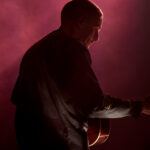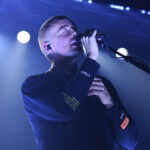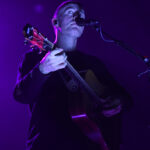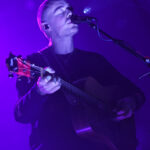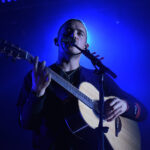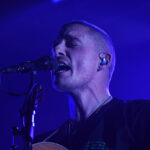Photography by Cole Matheson
By Megan Doherty
Check out Megan's Dermot Kennedy Show Review
Irish Singer/songwriter Dermot Kennedy performed at the House of Blues on Sunday, October 20. Before taking the stage, he sat down with WERS' Megan Doherty to talk about his debut album, Without Fear, songwriting, and the future of music.
You just released your debut album a couple of weeks ago, and it's already hit number one on the U.K. charts and been Ireland's fastest-selling record of 2019. Congratulations. How has the fan response been to the new songs at the live shows been?
Dermot Kennedy: Thanks. It's been really really nice. Particularly they're nice 'cause you never know. You really don't. And there are certain songs that when you're in the studio, you're like "I know this is going to be good live." And generally, say a song like "Without Fear," I know that'll be good live. We get to all lay into instruments and go for it, and that'll be good. But you never know how the other ones are going to be received, and so it's just refreshing. This is gig seven of the tour, and so we're still finding our feet with them too. It'll take a bit of time, but it feels great, and people know them already, which is crazy.
That's insane. Have there been any standout shows yet?
DK: Yeah, for sure. Montreal was mad, like so good. Chicago was really special, and I guess it's probably no coincidence it's the two places that we haven't been in a while. So everyone was trying to see the show.
Yeah, I was talking to some of the fans outside. They're already going crazy.
DK: Really? That's awesome.
Some of the songs on the album were put out a year or two ago. How long has "Without Fear" taken to make?
DK: It was the last song we recorded for the album, which is kind of weird because it's been around since I was twenty or something. It's an old song in my mind. I went to London for a week, and we put it together. The only way I'd ever played it before was just me and a guitar. It was completely acoustic, so I was like, "Okay, well I know I don't want it to just be that, but it could be a stripped-back song." Then we were like, "No, fuck it. Let's just put everything on it and go for it." So it became this thing of "we need strings, and we need drums and we need all this instrumentation on it." So a week became a really short period of time. It was very much around that time where everyone around you was like, "Is it done? Is it done? It needs to be done by this date." So, we were kind of rushing to get it done, but I feel like it was really nice for that to be the last one we did, considering it kind of represents the beginning of all this to me as well. So it was nice to do that.
How do you know when a song or album is done? What's the marking point?
DK: For an album, I definitely don't know. You know? 'Cause it's the first one I ever made. So I was just kind of like, "Okay, well I think it's done." You never know. 'Cause you're so attached to it, and you know all of the songs for ages and it can always be better. You'll always have a little idea. I mean maybe it needs this added to the song or maybe that song needs this, but I'm quite proud of myself in the sense that I just let it go. Then, in terms of songs, I guess you never know. And it's the same deal with the songs-lyrically is it finished? Who knows? I'm trying to get better at not worrying too much, and just trying to be creative all the time instead of really addressing everything.
You've put out great music in the past, but it seems like the singles from this new record have been all over the radio. What have you changed or developed in your sound to achieve this?
DK: It's funny 'cause people who do what I do sometimes dance around that topic of "but I didn't make that song to be played on the radio." Which you don't, you don't make music for the radio. You make music to try to do the best you can. But also, if you make a six-minute song, it's not going to be played on the radio. It's not. Also, I've never made anything with radio or success in mind. It's just I think I've become better as a songwriter and become a more direct songwriter in a way. Maybe these things that I say in long songs-say eight years ago, I was this rambling songwriter who just kind of bullshitted and kept saying lyrics that would come to you. Through the people I've met and worked with I realized it's a definite art form to take that and condense it. All these words seem taboo or something, but it's not a bad word to take something with a strong feeling and make it as concentrated as it can. That's just me getting better at that, hopefully.
Yeah, definitely. Your music has very powerful lyrics and vocals. How do you approach songwriting to build up your songs to be this way?
DK: It changes all the time. Sometimes I will start on a musical idea and write to that. I think that's a lovely way to do it because a piece of music you come up with makes you feel a certain way and it makes you think about a certain time in your life. I think that's really nice. If you follow that feeling then it's guaranteed authenticity in a way. It's like, "Well that definitely made me think of that time with whoever it is, so I'm gonna write on that." Or, if you write a poem and put it to music, that's cool too. I definitely don't have a set way that I write songs. If it goes well, I'm happy with it, and that's it. With "Power Over Me," we started with the title, and I had never done that before. I heard that's a thing that happens quite a bit in Nashville and different songwriting circles. But, for me, that was a challenge 'cause generally if I like a lyric, I'll write it and chase that feeling. I've never thought, "Okay, this song's called this, so I have to write about that." That was interesting for me.
For sure. So do you envision all these songs with all the production beforehand while you're writing, or does that come afterward and it's stripped back when you're writing?
DK: Kind of, yeah. If I start from the start in the studio, then, of course, it takes shape. If the song doesn't exist when I go into the studio, then I write it, and we figure the production out together. And it takes shape in that way, which is interesting because when you do it that way you have to be quite honest and brutal sometimes 'cause someone might try something. The producer might put something on it and if you hate it, you have to tell them. 'Cause it's your song, and you can't let it go. So there are times where things will happen and you'll be like, "Oh maybe it's okay." There are times where I let things happen, and I know I just won't let it exist in the world. I'm like, "Yeah, cool, it's fine," and then it will never happen. But you gotta be sure. Otherwise, I've had songs written in the past, I'll have written them at home, and then I will think up all of the production before I get to the studio. So the studio is literally me ticking boxes.
It sounds like you have a real emotional connection to your lyrics. Are they based on real experiences or are they more like fictional storytelling?
DK: No, they're real. For sure. In the past, when I was much younger, maybe when I hadn't had a lot of life, I guess, I wrote things that were sometimes fictional, but generally, always rooted in real experiences I would say. I think it's important. Especially now when we tour almost all year round, I can't be expected to get on stage and perform convincingly if I don't care about what I'm singing about, like if I don't truly care. So, all real life, yeah, for now.
Is there a lyric you wrote that you're most proud of?
DK: Kind of. There's some that I'm really proud of 'cause it's honest and it makes me feel great when I think about what that lyric means to me. Then there are others where I'm proud 'cause in a hip-hop way, almost, I feel like it's a clever lyric, and I feel like it sings real well. I wouldn't say I have one favorite. I'd say there are so many different ways in which I can be happy with a lyric. There might be a lyric that doesn't mean anything to me but the way I sing it adds a lot to the track, so that means a lot to me.
You mentioned hip-hop. How does that influence your lyrics?
DK: I feel like I respect it so much because there's so much emphasis on the spoken word in hip-hop. Every lyric has to count. I feel like in my genre, whatever that is, it's quite easy to get away with just singing things that feel good and not really honing in and perfecting it. So, what I love about hip-hop is there are rappers who get to the studio and the track is made, so all their job is to put words on it. There's such an obligation for that to be brilliant, and I take that from it. The other ways that it influences me I think I might not necessarily be aware of. I've been in the studio where producers tell me I write in a hip-hop sort of way or the way I deliver lines or the cadence I have when I sing sometimes mimics hip-hop, which is cool, but I try not to intentionally put hip-hop elements in my songs. I think it would have gone cheesy.
Yeah, you definitely blend that hip-hop sound with the acoustic singer/songwriter sound.
DK: For sure. It's exciting 'cause there's literally no limit to the amount of people who do the acoustic thing.
You're starting the revolution.
DK: I hope so.
Where do you think the future of music's going to be since hip-hop's on the top right now?
DK: True. Yeah, I don't know. Even talking about that, the guitar thing was you take Ben Howard and Bon Iver, and even Bon Iver's first album, and Fleet Foxes, and all that stuff-that feels like so long ago now. And really, for lack of a better word, seems almost irrelevant in the current culture. So I don't know where it's headed. I was talking to someone, and I was discussing with them how things are maybe simpler than they were-this whole thing of songs having three-second intros. That bugs me because that can then leak down towards literature, and books can become stupider, and then movies can demand less of you and they just give you everything straight away. So that can happen to music and any art form, and that's scary. But I was talking to someone who reckons there's a bit of a cultural awakening happening, and then maybe people will care more about lyrics and good books.
Hopefully
DK: Yeah! I hope so too. I'm glad I exist when I do to be honest, because if it's headed the other way it's bad.
For sure. So if there's one thing fans get out of this album, what do you hope it is?
DK: I don't know. I know I'm supposed to say, "Oh, comfort or solace or hope," which would be obvious, that's a given. I wouldn't write the songs if I didn't feel that way. So that is obviously the way I feel, but I would like it to appeal to everybody. If someone's not into lyrics, I'd like them to listen to it and respect the production and respect the instrumentation and arrangements 'cause I could've recorded all the songs acoustically and been like, "Oh my lyrics are this, check it out." But to me, that would be boring musically. You'll see it tonight. There's four of us on stage and it's a big production. I'm not trying to do this stripped back acoustic thing all the time. But of course at the root of it all, I'd love someone to be helped in any way by the music.
Last question. What song are you most excited to perform tonight?
DK: "Without Fear." For sure. It feels like a beast. It feels like-I should've said "Boston" though. Shouldn't I? No, "Without Fear" has been great lately. It's been very exciting. It's difficult to sing, but not difficult to the point where I hate it. It's nice. It's good. Yeah, that's my favorite.

